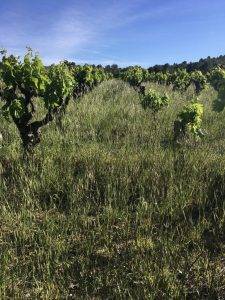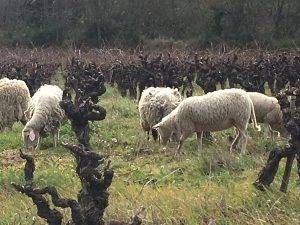Going for organic certification
We have been farming our vineyards organically since the we started in 2012. We have decided to make that official and have signed up with Ecocert, an organisation that requires compliance with their standards for organic certification. The process takes three years so we should be officially organic, and be able to put that cute little green leaf logo on our bottles from 2022.

What took us so long?
There are several reasons why we didn’t do this right from the beginning. Firstly the fee for certification, yet another cost for a small business. Secondly, who needs more paperwork? Thirdly, and more fundamentally, is the recognition that there are different ways of growing grapes and respecting the environment and following a set of criteria to get organic certification is just one of them. However, many customers have asked whether we are organic and an official certification or logo is much easier for consumers to understand that our ‘de facto organic’ explanation.
What do we put on our vineyards?
Organic viticulture means using no chemical fungicides, insecticides or weedkillers. Compost and fertilisers must be natural ie from plants or animals/animal waste. We do use sprays in our vineyards to stop the vines and grapes getting fungal diseases or eaten by insects (particularly the lava of the grape vine moth) but in organic farming these sprays come from a natural as opposed to a synthetic source. Here is a list of what we put on our vineyards in the last 5 years and why. In approximate order of the frequency of application. All are certified organic products.
- sulphur (fungal disease – powdery mildew)
- extract of orange (fungal diseases, so use less copper and sulphur)
- copper (fungal disease – downy mildew)
- Compost – plant or cow dung
- organic fertilizer, made from bird or pig poo. And sheep poo! (see photo)
- Pheromone pods (from 2019), to sexually confuse grape vine moth males and so replace insecticides such as ..
- Bacillus Thuringiensis, a naturally occurring bacterium (grape vine moth)
- Spinosad insecticide, a bacterium originally discovered in sugar cane (grape vine moth)
- Pyrethrins, an insecticide extracted from chrysanthemums. By law, grape growers have to use insecticide to reduce populations of cicadelle, the leaf hopper that spreads the disease flavescence dorée.
Organics in the winery
We are pretty non-interventionist in our winemaking so adhering to organic rules in the winery (eg lower sulphur) shouldn’t be a problem. A topic for another post!


